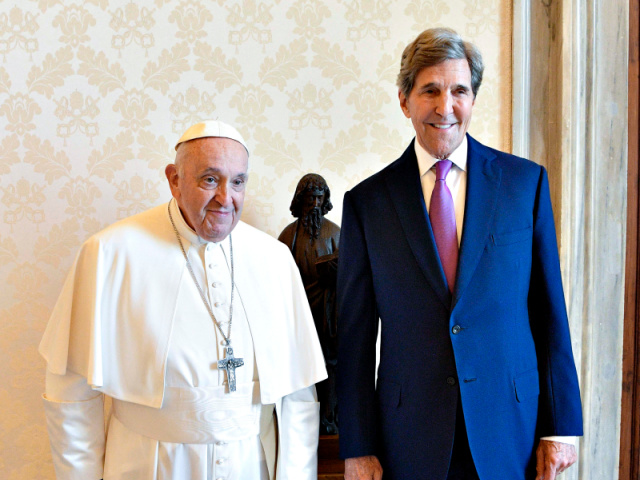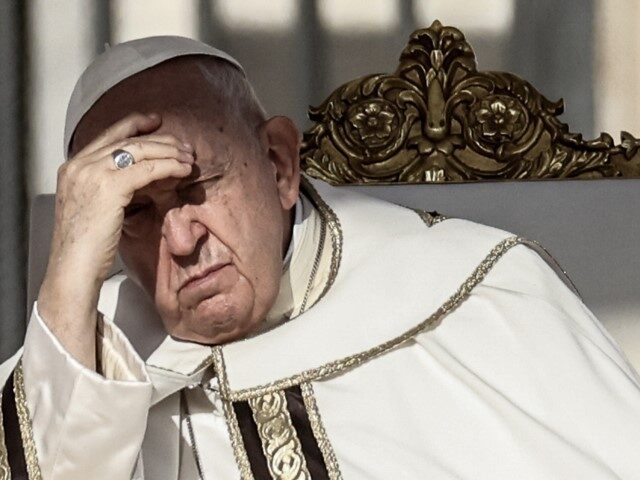ROME — In a curious case of cognitive dissonance, Pope Francis has simultaneously condemned “alarmism” over Europe’s migrant crisis while stoking the most extreme alarmism over the so-called “climate crisis.”
In late September, the pontiff visited Marseille where he decried the “alarmism” over Europe’s current migrant crisis, which has seen more than 209,000 illegal migrants arrive on the continent so far in 2023, the highest number since 2016.
Several Mediterranean ports have closed, the pope lamented, due primarily to “two words that resounded, fueling people’s fears: ‘invasion’ and ‘emergency.’”
“Yet those who risk their lives at sea do not invade, they look for welcome, they are looking for life,” he insisted. “As for the emergency, the phenomenon of migration is not so much a short-term urgency, always good for fueling alarmist propaganda, but a reality of our times” that “must be governed with wise foresight.”
Fast forward two weeks and the pope has published this week a new apostolic exhortation that resorts to the most extreme climate alarmism, insisting that humanity’s response to the climate emergency has not been adequate and now “the world in which we live is collapsing and may be nearing the breaking point.”
“Despite all attempts to deny, conceal, gloss over or relativize the issue, the signs of climate change are here and increasingly evident,” the pope writes, sweeping aside all reasonable skepticism.
In August 2023 a group of more than 1,600 eminent scientists, including two Nobel Prize winners, issued the “World Climate Declaration,” in which they stated outright: “There is no climate emergency.”
“Climate science has degenerated into a discussion based on beliefs, not on sound self-critical science,” the scholars asserted, enumerating a number of reasons for their criticisms.
The pope’s fear-mongering regarding global warming and contemporaneous denunciation of legitimate fears of uncontrolled immigration are nothing new.
Francis has called the effects of climate change “catastrophic,” arguing that atmospheric warming is “a global problem with grave implications” and “one of the principal challenges facing humanity in our day.”

Pope Francis meets U.S. Special Presidential Envoy for Climate John Kerry at the Apostolic Palace on June 19, 2023, in Vatican City, Vatican. (Vatican Media via Vatican Pool/Getty Images)
In 2022, the pope said that climate change has become an “emergency,” a word whose use for rampant immigration he has condemned.
That same year, Francis warned of “prophets of doom” while simultaneously threatening a looming climate change “crisis” that could wreak untold destruction on humanity.
The pope sent out a series of mixed messages in his 2022 homily for the World Day of the Poor, spreading intense fear of possible climate change disasters yet cautioning against “prophets of doom,” the “sirens of populism,” and self-interested “false messiahs.”
Pope Francis has frequently railed against a “politics of fear” as an enemy of the democratic process but has also stoked fears of an impending climate apocalypse in order to incite people to action.
In a 2016 speech delivered at the Vatican, Francis denounced making political decisions based on fear, because fear “weakens and destabilizes us, destroys our psychological and spiritual defenses, and numbs us to the suffering of others.”
At the same time, the pope has asserted that humanity has only “ten years” to restore the earth’s ecosystem, a terrifying proposition.
In his 2021 Message for the Launching of the United Nations Decade on Ecosystem Restoration, Francis insisted that the “current environmental situation calls us to act now with urgency.”
“We risk floods and hunger and severe consequences for ourselves and for future generations,” the pope warned.
It is time to act urgently “to restore the nature that we have been damaging and exploiting for too long,” Francis stated. “Otherwise, we risk destroying the very basis on which we depend.”
We have “ten years,” Francis declared, “to restore the ecosystem, which will mean the integral restoration of our relation with nature.”

COMMENTS
Please let us know if you're having issues with commenting.